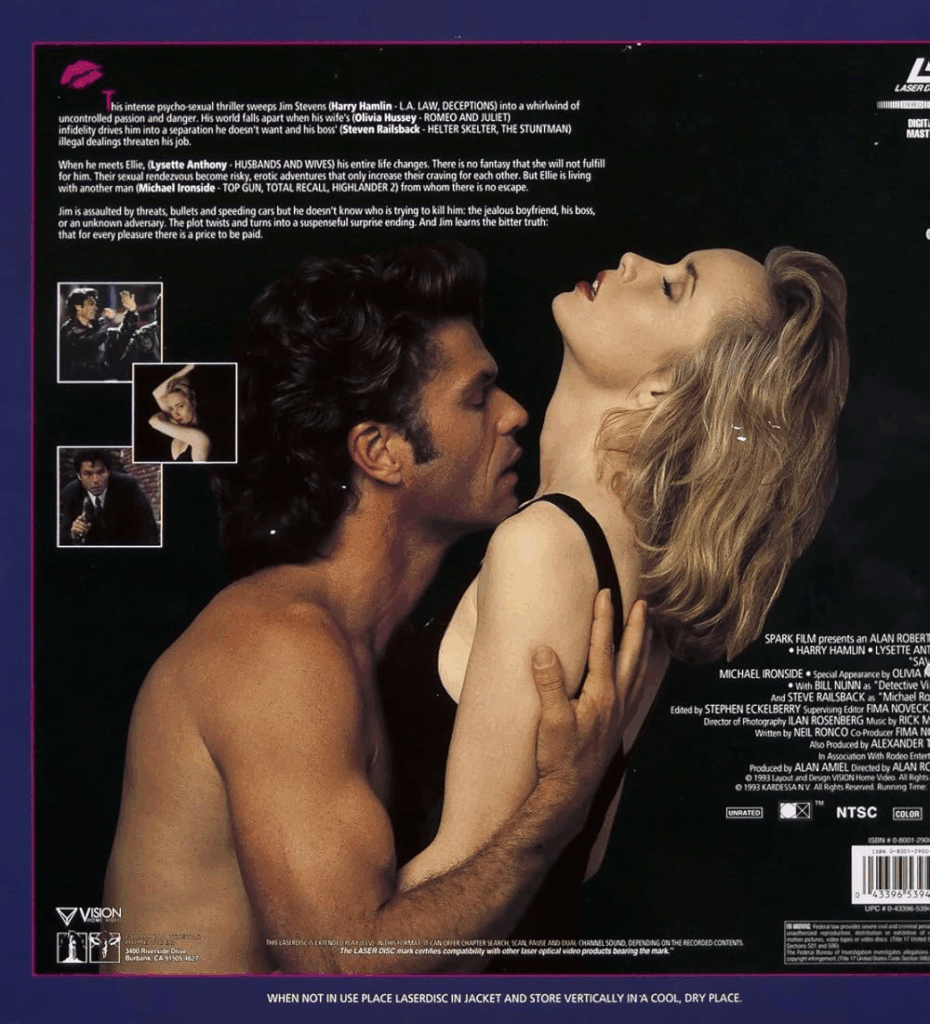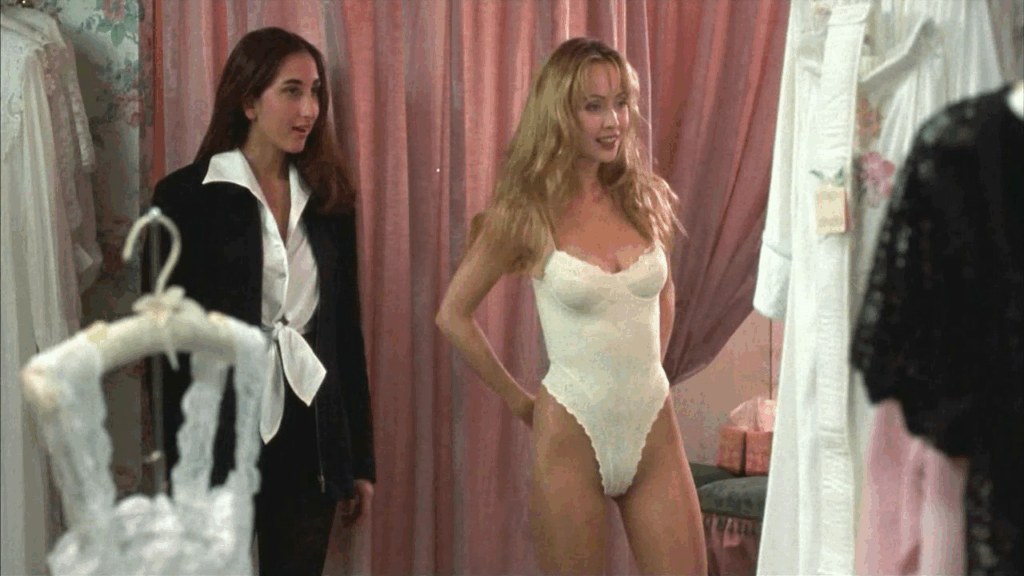𝑺𝒂𝒗𝒆 𝑴𝒆 1994

Introducing Save Me (1994) – A Comprehensive Overview
A 1990s *** of Seduction and Deception
Save Me (1994), directed by Alan Roberts, is an American *** that epitomizes the 1990s wave of ***, direct-to-video neo-noir films. Starring Harry Hamlin as a beleaguered stockbroker, Lysette Anthony as a seductive femme fatale, and Michael Ironside as her enigmatic psychiatrist, the film weaves a tale of lust, betrayal, and convoluted schemes. Released on March 23, 1994, on video after a limited theatrical run, Save Me emerged in the wake of hits like Fatal Attraction (1987) and Basic Instinct (1992), aiming to capitalize on the era’s appetite for steamy thrillers. Despite a talented cast and moments of intrigue, the film is widely criticized for its implausible plot, lackluster execution, and reliance on ***, earning a reputation as a “guilty pleasure” for fans of ***. This article provides a comprehensive exploration of the film’s narrative, cast, production, themes, reception, and cultural significance, offering a complete introduction to its polarizing legacy.

Synopsis: A Tale of Lust and Lethal Manipulation
Save Me centers on Jim Stevens (Harry Hamlin), a Los Angeles stockbroker facing a crumbling personal and professional life. Recently separated from his wife, Gail (Olivia Hussey), and struggling with a young son, Jim is also under pressure at work, where his boss, Robbins (Steve Railsback), threatens to fire him for dubious dealings. His mundane existence takes a dramatic turn when he encounters Ellie (Lysette Anthony), a stunning woman in a lingerie store who catches his eye with a provocative glance. After witnessing her being manhandled by a menacing man, Oliver (Michael Ironside), Ellie slips Jim a Post-It note with her phone number and the plea “Save me,” igniting his curiosity and desire
Jim contacts Ellie, and their flirtation escalates into a torrid affair, marked by *** in his car and home, despite Gail’s lingering presence in family photos. Ellie claims Oliver, initially presented as her abusive boyfriend, is a threat, begging Jim for protection. As their relationship intensifies, strange events unfold: Jim is chased by a car, shots are fired at him, and threatening phone calls with foreign accents warn him to back off. Suspicion falls on Oliver, who Ellie later reveals is her psychiatrist, treating her for alleged mental instability. The plot thickens when Oliver is killed with Jim’s gun, implicating him in a murder he didn’t commit, and Robbins’s schemes at work further entangle Jim in a web of deception
The narrative spirals into a series of increasingly implausible twists, revealing Ellie’s manipulative nature and a conspiracy involving Robbins, who covets her. Detective Vincent (Bill Nunn) investigates, adding pressure as Jim unravels the truth about Ellie’s motives and Oliver’s role. The climax, described by IMDb reviewer MERK as “ridiculous with each rewrite,” hinges on specious motivations and a rushed resolution, leaving Jim to navigate betrayal and danger to clear his name . Running at 93 minutes, Save Me is a quintessential 1990s ***, prioritizing steamy encounters over coherent plotting, with a noirish veneer that both captivates and frustrates

Cast and Performances: A Talented Cast in a Flawed Script
The performances in Save Me are a mixed bag, with Lysette Anthony’s femme fatale standing out amidst an uneven ensemble. Harry Hamlin, as Jim Stevens, plays the hapless everyman with a wooden earnestness that critics like Junta Juleil found “insulting to wood,” though his L.A. Law charisma carries the role [web:6]. Hamlin’s portrayal, while sincere, struggles with the script’s lack of depth, making Jim’s gullibility more frustrating than sympathetic, as Waiching’s Movie Thoughts notes [web:23]. His chemistry with Anthony, however, fuels the film’s erotic charge, per Amazon reviews .
Lysette Anthony, as Ellie, delivers the film’s standout performance, her “nuanced poise” and “English rose loveliness” stealing scenes, per IMDb and Noirish [web:0,16]. Anthony’s ability to shift from vulnerable to manipulative, with expressive eyes and sultry confidence, elevates Ellie beyond the script’s clichés, though her frequent ***—criticized by Letterboxd as ***—overshadows her acting, per . Her role, balancing seduction and deceit, aligns with her Playboy appearance to avoid typecasting, as Noirish details .
Michael Ironside, as Oliver, brings his signature intensity to a woefully underused part, appearing mostly in the background until a pivotal scene, lauded by Junta Juleil as “exceptionally memorable” [web:6]. Critics like IMDb lament his wasted talent, given his Total Recall (1990) prowess [web:0]. Steve Railsback, as Robbins, is suitably sleazy but one-dimensional, per Letterboxd , while Bill Nunn’s Detective Vincent offers a grounded presence, his “expert” cop role underutilized, per Noirish [web:16]. Supporting actors, including Olivia Hussey as Gail and cameos like Kato Kaelin, add minor flair but little substance, per IMDb [web:0,5]. The ensemble’s potential, hampered by a “lousy” script, per Waiching’s Movie Thoughts, makes Anthony’s performance the film’s saving grace .

Production: A Low-Budget Erotic Noir
Directed by Alan Roberts, known for B-movies like The Happy Hooker Goes Hollywood (1980), Save Me was produced by Spark Films and Vision International for an estimated $1-2 million, per TCM [web:10]. Written by Neil Ronco, the screenplay aimed to emulate Fatal Attraction’s formula but faltered with “atrocious” dialogue and plot holes, per Waiching’s Movie Thoughts. Filming occurred in Los Angeles from November to December 1992, capturing urban settings—stockbroker offices, malls, suburban homes—with a low-budget aesthetic typical of direct-to-video thrillers, per TCM .
Cinematographer Ilan Rosenberg employed a neon-lit, soft-focus style, framing *** scenes with “***” aesthetics, per Junta Juleil, evoking 1990s late-night cable vibes . Richard Marvin’s synth-heavy score, with “pulsating drum machines,” adds a dated, trashy flair, criticized by Letterboxd as unmemorable [web:7]. Production design by Hilary Rosenfeld, with lingerie stores and dimly lit bedrooms, prioritizes eroticism over realism, per AllMovie. The R-rated version (and an unrated cut released on March 23, 1994) includes graphic ***, balancing market demands with video store appeal, per TCM.
Challenges included a tight 30-day shoot and budget constraints, limiting production polish, as IMDb notes [web:0]. Casting Hamlin and Anthony leveraged their TV fame (L.A. Law, Dark Shadows), but the script’s weaknesses hindered their efforts, per FilmAffinity [web:13]. The film’s video release via MGM/UA Home Video, rather than a wide theatrical run, reflects its B-movie status, per Box Office Mojo’s lack of theatrical data. Premiering at minor festivals, it found its audience on VHS and late-night TV, per Noirish [web:16].

Themes and Symbolism: Seduction, Betrayal, and Moral Decay
Save Me explores themes of seduction, betrayal, and moral decay, using its *** framework to probe human weakness and societal hypocrisy. Jim’s affair with Ellie, sparked by her “Save me” plea, reflects the lure of forbidden desire, a staple of 1990s noir inspired by Fatal Attraction, per Variety’s genre analyses. Ellie’s manipulation, revealed through twists, critiques the femme fatale archetype, though her mental instability trope, per IMDb, risks misogyny [web:0]. The film questions trust, with Jim’s gullibility mirroring societal blind spots, as Noirish notes [web:16].
Class and ambition surface in Jim’s stockbroker struggles, with Robbins’s schemes symbolizing corporate greed, per Letterboxd [web:7]. Gender dynamics are central, with Ellie’s *** empowering and ***, a dichotomy Waiching’s Movie Thoughts calls “trashy” yet compelling [web:23]. Symbolically, the Post-It note represents a deceptive call for rescue, per Noirish, while the red convertible sex scene evokes reckless passion, per Junta Juleil [web:6]. Los Angeles’s urban sprawl mirrors Jim’s unraveling life, a noirish motif, per Film Comment. Compared to Caught (1996), previously discussed, which explores infidelity through gritty drama, Save Me uses softcore noir to probe betrayal, both featuring seductive women (Ellie, Betty) but differing in execution and depth.

Reception and Controversy: A Divisive B-Movie
Save Me received overwhelmingly negative reviews, earning a 10% Popcornmeter on Rotten Tomatoes from fewer than 50 audience ratings and no critic score due to sparse reviews [web:15]. IMDb rates it 4.1/10 from 436 votes, reflecting its niche appeal [web:0]. Roger Ebert’s site lacks a review, but The Austin Chronicle’s absence of coverage suggests its obscurity. Waiching’s Movie Thoughts calls it “beyond mediocre,” slamming its “lousy” script and “cringe” sex scenes, though praising Anthony’s allure [web:23]. Junta Juleil gives it 2.3/5 stars, lauding Ironside’s scene but decrying the “ridiculous” plot and “trashy” romance [web:6]. Noirish appreciates Anthony’s “memorable” femme fatale but notes the film’s “unremarkable” execution [web:16]. Letterboxd users like @sleazefan88 find it “kind of enjoyable” for its sleaze, while @cinephile99 calls it “predictable” and “slow,” per web:7.
Audience reactions, per Amazon and IMDb, split between fans of Anthony’s *** and detractors of the “atrocious” plot, with MERK labeling it a “monstrosity” [web:0,4]. The film’s box office is undocumented, likely minimal due to its video release, but its VHS and DVD sales sustained a cult following, per eBay listings [web:22]. Controversy centered on its ***, criticized by Waiching’s Movie Thoughts as ***, with Anthony’s *** overshadowing her acting, per *web:23]. The “robotic” sex scenes, per Letterboxd, and rushed ending drew ire, while the depiction of Ellie as “mentally disturbed” sparked debate over misogynistic tropes, per IMDb [web:0,7]. Common Sense Media’s absence of a rating suggests its obscurity, but its R rating reflects “strong sexual content, ***, violence, and language”

Cultural Significance: A Snapshot of 1990s ***s
Save Me emerged during the 1990s *** boom, following Fatal Attraction and Basic Instinct, when direct-to-video films flooded cable and video stores, per Film Comment. Released on March 23, 1994, amid cultural shifts toward sexual openness and economic prosperity, its tale of infidelity and deception tapped into anxieties about trust and morality, as The Atlantic’s genre analyses note. The Los Angeles setting, with its stockbroker offices and malls, reflected the era’s capitalist excess, per Journal of Popular Film and Television.
Hamlin’s casting leveraged his L.A. Law fame, while Anthony’s Playboy appearance and Ironside’s genre pedigree (Scanners) added B-movie allure, per Noirish [web:16]. Compared to The Girl Next Door (2004), previously discussed, which blends teen comedy with provocative romance, Save Me uses noirish sleaze to explore betrayal, both featuring seductive leads (Ellie, Danielle) but differing in tone and cultural impact. Save Me’s influence is minimal, but its cult status endures on streaming platforms like Tubi and Pluto TV, per JustWatch [web:2,3]. X posts from 2025, like @bmoveifreak, call it a “sleazy time capsule,” reflecting nostalgia for 1990s thrillers [post:0].

Legacy and Availability
Save Me remains a divisive artifact of 1990s ***s, celebrated by B-movie fans for Anthony’s performance and Ironside’s cameo but derided for its shoddy script and implausible plot. Its 1994 VHS, 2004 DVD, and 2015 Blu-ray releases by MGM/UA, including minimal extras, are sought by collectors, per eBay [web:22]. Academic analyses in Journal of Popular Film and Television frame it as a low-budget noir exemplar, while Letterboxd reviews, like @noirfan’s “guilty pleasure,” highlight its niche appeal [web:7].
As of May 23, 2025, Save Me is available for streaming on Tubi, Pluto TV, fuboTV, MGM+ via Philo, and MGM+ Roku Premium Channel, with ads or subscription, per JustWatch [web:2,3]. Rental and purchase options exist on Amazon Video, Apple TV, and Google Play, per Reelgood [web:3]. Physical DVD copies are available through retailers like Amazon and eBay [web:4,22].

Conclusion: A Flawed but Fascinating Erotic Noir
Save Me (1994) is a quintessential 1990s ***, blending *** with convoluted deception in a low-budget package. Alan Roberts’s direction, bolstered by Lysette Anthony’s captivating performance and Michael Ironside’s fleeting menace, crafts a film that’s both a guilty pleasure and a cautionary tale of B-movie excess. While its “ridiculous” plot and “trashy” *** draw scorn, its raw energy and noirish allure make it a curious relic for fans of the genre. For those drawn to 1990s sleaze, ***s, or forgotten gems, Save Me offers a provocative, if flawed, journey—one that’s as alluring as it is absurd, leaving viewers to decide if it’s worth saving.